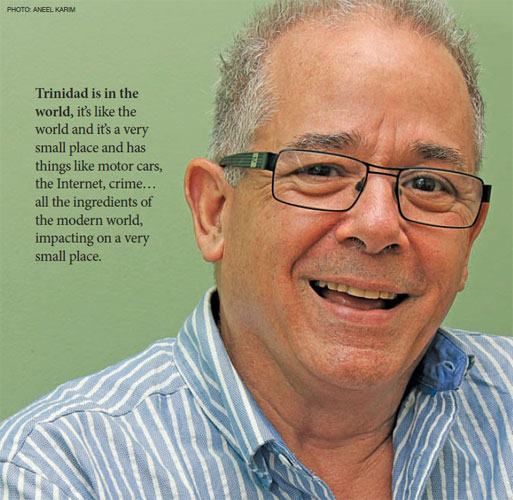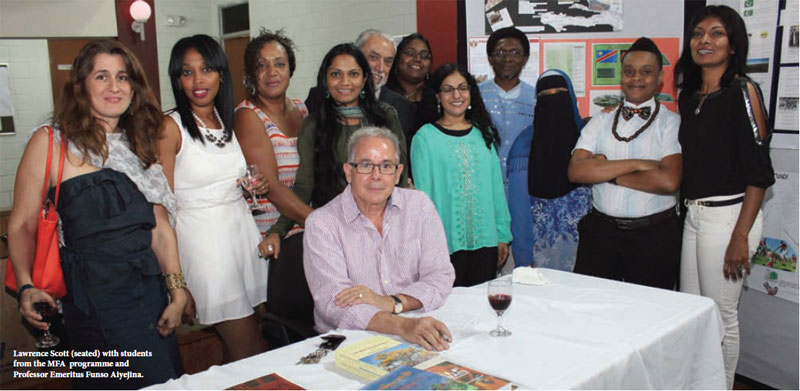 |
 |
 |
|
April 2016 |
What does it mean for you to be writer-in-residence in 2016? I did it before in 2004, but it’s always nice to come back to UWI. I’ve known Prof. Aiyejina for a long time, 40 years. I came back to live in Trinidad in ’77 and he was a young student and we were young aspiring writers. At UWI, I also did a lot of research at West Indiana (special collection at the Alma Jordan Library). So UWI played a big part in my development right from the beginning. How did you decide to get into writing? It goes back to the time I met Funso, I always wanted to write. I came back here to teach and it was during that period, I was able to find myself and able to start writing. Earl Lovelace was very significant in that time for me just to see him and talking to him, seeing a writer functioning. I started writing in those years… being in Trinidad and discovering, that’s what I want to write about and now I’m slightly moving away from here. Are there any rituals or exercises that you use to stay creative? You need to be writing all the time. Every day. You need to have a notebook. And what I learned in “Light Falling on Bamboo,” research is very important. Writing is about reading... you should be searching for the best writers… find out how it’s done by imitating them. Walcott said that sometimes he’d write over the light of an established poet and copied. That learning by model is very important and reading widely... that culture of writing every day, constant reading. I discovered a magnificent writer called Colm Tóibín, one of his books was made into a film “Brooklyn,” simply fantastic. Some people view writing as an impractical profession in the time of a recession, what are your thoughts? I think it’s part of a holistic education. In creative writing, you’re exploring your emotions; you’re becoming empathic in writing characters, to enter into other lives. All that is part of education... I think more literature, more writing, but for education, not necessarily “I’m going to be a writer.” If you’re going to be a writer, you’re going to be a writer. You’re going to find a hut in the forest to go and write or maybe a bedroom in the back of your house that you feel comfortable, but you’re going to write. Aside from not reading widely enough, do you see any recurring themes coming up with your students? I think they’re excited… most people are writing about themselves as women, in problematic relationship with men… writing about taking her position in the world, or about children, children who’ve been abused or damaged lives. Very strong themes and to write about those things is difficult. For me coming back now, the sort of things people are choosing to write is quite different. Trinidad is changing, hugely all the time. Trinidad is changing, please elaborate. It’s changing in obvious ways, a lot of what I’ve been saying because people ask me all the time, “What is it about Trinidad?” and I say it’s like any other part of the world, Trinidad is in the world, it’s like the world and it’s a very small place and has things like motor cars, the Internet, crime… all the ingredients of the modern world, impacting on a very small place. What advice would you give to students trying to retell the stories of important historical figures like you did with Michel-Jean Cazabon? When I was finished my research, “Light falling on Bamboo,” I realised you have to become as familiar with the time you’re writing about as if it was contemporary to you. If you see research in someone’s book that means it’s not a good book – you want to see the story. You need more than you’ll ever possibly use in the book, you also need language, food and travel. The Gala ceremony celebrates the 400th anniversary of Shakespeare’s death. How has Shakespeare’s work influenced you? How could Shakespeare not be an influence? His language and wonderful stories. I write poetry as well and Shakespeare is poetry. I don’t know how students can cope with learning Shakespeare without seeing it really well acted. Shakespeare is about big human emotions – jealousy, revenge, love, humour, hubris… and extraordinary writing. Once you see it come together, it all works. I think it’s hard for a student just to start reading it and getting it. And yes, we should celebrate Shakespeare and why not, but perhaps we should celebrate Dante as well! I don’t see why Shakespeare should be so privileged, but I don’t mind being on the same stage as Shakespeare. With your work, how you’ve been able to touch on so many different themes from religion to eroticism to history, how do you balance that and how do you get the courage to touch on things knowing the kind of conservatism that exists in the Caribbean? I suppose you’re talking about “Aelred’s Sin” – When I came down to launch it, I was quite apprehensive, but the book had a very good reception in the press. Since that book in 1998, the amount of literature has changed and Trinidad is an odd, liberal yet conservative society... but we have come a long way with subjects like that and if “Aelred’s Sin” played a part in that, then great. The book came out of my own connection with England. In the middle of writing that book people were beginning to die of AIDS, it’s not something I choose necessarily, you just go with what you feel strongly about. I think that’s the best kind of writing to do – you have to write out of your guts and your heart. To me it’s commitment. What’s next for you? I got a big taste for historical research so that’s all I have to say is next for me. I’ve got a draft and I’m working on it.
After this interview, the soft-spoken Scott I met was transformed into a role-playing chameleon as he gave spirited readings from his poetry and prose works including: Leaving by Plane Swimming Back Underwater, Golconda – Our Voices, Our Lives and Light Falling on Bamboo at the Campus Lit Week’s Gala Reading and Closing Ceremony – an event put on by the first-year MFA in Creative Writing students. Scott shared the stage with an acting troupe from the Department of Creative and Festival Arts (DCFA) who performed an excerpt of Shakespeare’s Much Ado about Nothing. The camaraderie between Scott and the MFA students was evident as one of the Masters of Ceremonies for the night, L.A. Wanliss (the other M.C. was Gilberte O’Sullivan) gave an emotional vote of thanks, praising Scott for his mentorship as well as other members of staff and her fellow students without whom, she noted, the event would not be possible. The night ended with satiated literary lovers hungry to purchase Caribbean novels from the tables set up by The UWI Bookstore and Paper-based Bookshop in the atrium. Lawrence Scott’s books can be purchased at The UWI Bookstore or at Lexicon Trinidad Limited. Jeanette Awai is a freelance writer and member of staff at The UWI’s Marketing and Communications Office, St. Augustine Campus. |


 In the midst of a recession what do we need? “I think more literature, more writing,” says Lawrence Scott, second-time writer-in-residence at the Department of Literary Cultural and Communication Studies. Scott was also the featured guest speaker for Campus Literature Week 2016 commemorating the 400th anniversary of Shakespeare’s death. Jeanette Awai sat down with the renowned writer of works such as “Leaving by Plane Swimming Back Underwater,” and “Light Falling on Bamboo” among others, to discuss his growth as a writer under the influence of “Funso” (Professor Emeritus Funso Aiyejina), how his writing led him to love historical research and the difficult themes being grappled by the current crop of MFA in creative writing students.
In the midst of a recession what do we need? “I think more literature, more writing,” says Lawrence Scott, second-time writer-in-residence at the Department of Literary Cultural and Communication Studies. Scott was also the featured guest speaker for Campus Literature Week 2016 commemorating the 400th anniversary of Shakespeare’s death. Jeanette Awai sat down with the renowned writer of works such as “Leaving by Plane Swimming Back Underwater,” and “Light Falling on Bamboo” among others, to discuss his growth as a writer under the influence of “Funso” (Professor Emeritus Funso Aiyejina), how his writing led him to love historical research and the difficult themes being grappled by the current crop of MFA in creative writing students. 